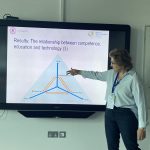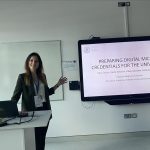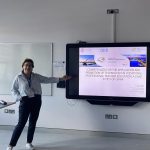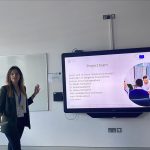News from EDEN-DLE 2023 konference “Yes we can! – Digital Education for Better Futures”
On 18-20 June,2023 VMU researchers from Institute for Study Innovations at Education academy prof. dr. Airina Volungevičienė, assoc.prof. Elena Trepulė, dr. Estela Daukšienė and dr. Giedrė Tamoliūnė and prof. Genutė Gedvilienė from Education Academy took part in the international EDEN conference “Yes we can! – Digital Education for Better Futures” at Dublin City University, Ireland. The conference focused on how artificial intelligence tools can help or hinder teaching, learning and digital assessment. Participants shared how these tools are already being used by institutions, lecturers and students, but at the same time reminded us that in order to prevent these tools from becoming more threatening, it is important to keep in mind the true nature and purpose of assessment. Another widely discussed topic, which was the focus of a large number of presentations, was micro-credentials and their role from the institutional, teacher, learner and employer perspectives. It was interesting to note that there is still a different understanding of micro-credentials, with some seeing micro-credentials as small-scale learning programs and others as digital credentials.
During the event, prof.dr. Genute Gedvilene was awarded the title of EDEN Fellow. This title is awarded to scholars for their long-term contribution to research in the field of technology-enriched education and active contributions in sharing research results in international community. Prof. Genute Gedvilene’s and VMU PhD students Wang Bin paper was awarded among 8 best conference papers. Also, during the EDEN Board meeting, the nomination of Dr. Giedre Tamoliune to become a member of the EDEN NAP (Network for Academics and Professionals) Steering Committee was approved.
VMU researchers not only gained knowledge and interest in innovative practices, but also actively participated and shared their own experiences. Estela Daukšienė moderated the European Knowledge Building Hub session “Equity and accessibility in Digital Education. Designing Strategies to Produce Equity in Knowledge-Building Activities”. During the session, researchers, scholars and practitioners shared insights and ideas on the challenges of professional activities of national and regional associations and individual members of the community of practice, as well as the challenges of ensuring equity in European Knowledge Building activities in the Hub. Prof. Margarita Teresevičienė as the president of Lithuanian Distance and e-Learning Association (LieDM) also participated in the session, sharing the experiences and issues of digital education by Lithuanian educational institutions. Giedrė Tamoliūnė gave the presentation “Preparing digital micro-credentials for Universities”, which presented the results of the national research project “Digital Micro-credentials in Higher Education”. Presentation covered theoretical insights, as well as practical experiences, and process of issuance of a micro-credential from both – Moodle virtual learning environment, and the European Digital Credential Infrastructure in Europass. We are pleased to be one of the first to issue micro-credentials in Lithuania and to be able to share our experience with experts from around the world.
This research has been implemented within the framework of the research project “Digital Micro Credential in Higher Education” (project no. 13.1.1-LMT-K-718-05-0003). This project has received funding from European Regional Development Fund (project no 13.1.1-LMT-K-718-05-0003) under grant agreement with the Research Council of Lithuania (LMTLT). Funded as European Union’s measure in response to COVID-19 pandemic.
You can watch the conference recordings of the plenary sessions on the EDEN Youtube channel.
We would like to remind you that the ISI team, together with researchers from other institutions, has developed and produced training materials that reflect the latest topics analysed in international conferences:
- Designing transparent assessment strategies for online learning in HE
- Monitoring, supporting, and engaging students based on the evidence generated by digital technologies
- Ensuring digital and micro-credentialization of learning as a part of transparent assessment for recognition of learning outcomes
- Teacher training material on “How to flip your online class?”


















